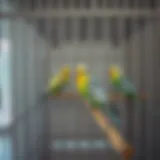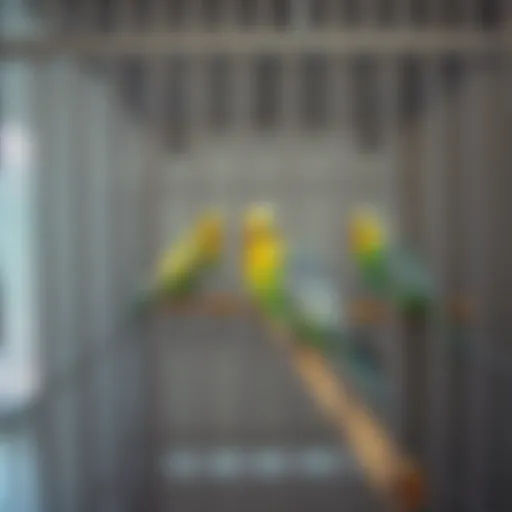Understanding the Death of Pet Birds: A Comprehensive Guide
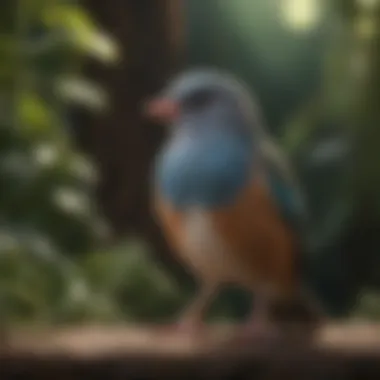

Intro
The loss of a pet bird brings a unique combination of emotional and practical challenges. This guide aims to equip pet bird owners with an understanding of avian mortality, the grieving process, and the necessary steps to take following the death of a bird. Throughout this article, you will find insights into the various factors that affect bird longevity, the importance of health checks, common diseases, and how to memorialize a beloved feathered companion.
Understanding why birds die can help you as a caregiver to navigate your emotions during this painful time. Just like other pets, birds face health issues, environmental stressors, and even accidents that contribute to their passing. The subsequent sections will dive deep into avian care, emotional well-being, and health safety to help you better appreciate the life of your pet and ease the process of saying goodbye.
Avian Care Basics
The foundation of a pet bird's life lies in proper care. When owners prioritize the health and well-being of their birds, they can contribute to longer, happier lives. A clear understanding of nutrition, habitat, and hygiene is essential.
Importance of Proper Nutrition
Proper nutrition ensures that your bird can thrive. A diet rich in seeds, fruits, vegetables, and commercial bird mixes is crucial. Each species has specific dietary requirements, which need to be understood for optimal health. For example, parakeets thrive on a mixture of seeds and fresh produce, while cockatiels benefit from pellets combined with occasional fruits.
Understanding Bird Species and Their Needs
Diverse species of birds have unique requirements. Researching the particular needs of your bird can prevent health complications. For instance, budgerigars require less fat in their diet than larger parrots and do well in social environments.
Basics of Birds Habitat Setup
Creating the right habitat is vital. The cage should be spacious enough for movement, and it must include perches, toys, and safe materials. Adequate ventilation and cleanliness are also key factors in maintaining a healthy environment.
Grooming and Hygiene Tips
Regular grooming helps prevent health issues. Bathing your bird and ensuring that its feathers are clean will aid in the overall well-being of your pet. Additionally, trimming nails and beaks should be part of routine care, as it helps maintain comfort and hygiene.
Interacting with Your Pet Bird
Developing a strong bond with your pet bird is essential. This requires patience and understanding the preferences of your bird. Birds need social interaction and engagement in order to thrive.
Building Trust and Connection
Establishing trust may take time. Allow your bird to approach you and familiarise itself with your presence. Use calm tones and gentle movements to avoid scaring it.
Training Techniques and Tips
Training your bird can be rewarding. Positive reinforcement, such as treats, is a useful method. It engages the bird and encourages learning new behaviors.
Fun Activities for Bird Owners and Their Birds
Birds enjoy mental stimulation. Engage them with toys that can be shredded or puzzles that require them to work for treats. This encourages natural behaviors and keeps them physically active.
Recognizing Bird Cues and Behaviors
Understanding the cues your bird displays is crucial. Changes in vocalization or behavior often indicate stress or discomfort. Observing these signs allows you to respond and care effectively.
Emotional Well-Being of Birds
A bird's emotional health is essential for its overall happiness. Birds thrive in environments that encourage socialization and play.
The Role of Play and Socialization
Interactive playtime enhances birds' mental well-being. Ensure that they have time outside their cage to explore and interact with you. Bonding happens through shared experiences.
Enhancing Birds' Emotional Health
Positive environments promote emotional stability. Birds that are left alone for long periods can become anxious. Ensure a daily routine that allows for interaction.
Assessing Bird Stress and Remedies
Recognizing signs of stress helps you take action. Excessive vocalization or feather plucking could indicate anxiety. Providing comforting toys or a secure nesting area may help mitigate stress.
Building Strong Human-Bird Bonds
A strong bond can result in increased trust and a happier bird. Time spent together performing daily tasks or simply being present can foster this connection.
Bird Health and Safety
Keeping your bird safe involves being aware of health and environmental hazards. Regular checks encourage prevention and early detection of illness.
Common Health Issues and Prevention
Birds are susceptible to various diseases, including respiratory infections and nutritional deficiencies. Regular vet visits are crucial.
Routine Veterinary Care


A veterinarian experienced in avian care can provide guidance. Routine check-ups help assure that your bird remains healthy.
Environmental Hazards to Avoid
Certain household items are hazardous to birds. Strong cleaning products and toxic plants can pose serious risks. Familiarize yourself with safe choices to ensure your bird’s safety.
Signs of Illness or Distress
Early detection of illness is vital for treatment. Be alert to changes in eating habits, behavior, or droppings, as these could indicate health problems.
Fun Facts and Quirky Insights
Understanding more about birds adds a layer of appreciation to their care.
Unique Traits of Popular Bird Species
Each species possesses uniqueness. For instance, African Grey Parrots are known for their impressive ability to mimic human speech, while finches exhibit vibrant colors.
Historical and Cultural Significance of Birds
Birds have appeared in mythology, art, and cultural traditions across the globe. Their presence symbolizes freedom and beauty.
Famous Bird Owners and Their Stories
Many notable people have had a special connection with birds. For instance, Albert Einstein kept a pet parakeet, demonstrating that birds often inspire creativity and companionship.
Understanding the complexities surrounding pet birds, including care, health, and emotional needs, helps enhance the experience for both the owner and the bird.
By integrating this knowledge into your caregiving, you create a nurturing environment conducive to a long, fulfilling life for your avian companion.
Prelims to Pet Bird Mortality
Understanding pet bird mortality is critical for bird owners, breeders, and enthusiasts alike. The topic encompasses a range of factors, including health, environment, and the emotional impact on owners when faced with the loss of a pet bird. Acknowledging these aspects not only prepares one for the inevitable but also fosters a deeper connection with avian companions.
Pet birds, like all animals, have a finite lifespan, and being aware of this reality is essential for informed care. Recognizing the importance of regular health check-ups and understanding common health issues can extend a bird's life. Furthermore, knowing how to cope with the emotional ramifications of losing a bird is equally significant, as it allows owners to process their grief in a healthy manner.
The journey through pet bird mortality may evoke feelings of anxiety or sadness, but awareness can be empowering. This section sets the stage for a thorough exploration of the causes of mortality, signs that indicate health issues in birds, and ways to memorialize them. Owners equipped with this knowledge can navigate the challenges more effectively.
Defining Pet Bird Mortality
Pet bird mortality refers to the end of life in birds kept as pets, encompassing both natural and unnatural causes. Understanding mortality in pet birds requires clarity around various terms. Mortality can arise due to factors such as age, disease, or accidents. It is important to consider each aspect to foster a comprehensive understanding of this sensitive subject.
While every bird will eventually reach the end of its life, factors influencing longevity include genetics, environment, diet, and care provided by owners. Each of these elements plays a vital role in a bird's health and can contribute to its lifespan. A clear definition enables pet owners to focus on how to optimize their birds' lives while also confronting the reality of mortality.
Understanding Common Lifespan Expectations
Lifespan expectations vary among different species of pet birds. For instance, a budgerigar might live around five to ten years, whereas a cockatoo could thrive for over 60 years under optimal conditions. Understanding these differences assists owners in setting realistic expectations and making appropriate care decisions.
Several factors influence a bird's lifespan:
- Species: Different species have unique biological lifespans.
- Care: Regular vet check-ups, a balanced diet, and mental stimulation can prolong life.
- Environment: A safe and enriching environment contributes to the overall well-being of pet birds.
It is helpful for owners to familiarize themselves with the common lifespan of their particular bird species. This knowledge fosters a proactive approach to care, preparing owners for possible aging-related health issues they may encounter over time.
Common Causes of Death in Pet Birds
Understanding the common causes of death in pet birds is essential for owners who wish to provide the best care for their avian companions. Awareness of these factors can help in implementing preventative measures, ultimately extending the longevity and quality of life for pet birds. Recognizing the symptoms and underlying issues linked to avian mortality not only prepares owners for potential health challenges but also fosters informed decision-making in critical situations.
Infectious Diseases
Infectious diseases are a leading cause of mortality among pet birds. These diseases can spread quickly within flocks and can be difficult to detect until they have progressed. Common infections include avian influenza, psittacosis, and various strains of viruses that can impact respiratory health. Pet owners should observe their birds closely for any unusual behavior, such as decreased activity or changes in eating habits.
Providing regular veterinary check-ups is crucial. Many infectious diseases can be mitigated through vaccinations and preventative measures. Additionally, maintaining a clean environment that includes regular cage cleaning and isolation of sick birds can reduce the spread of infectious agents. This proactive approach can significantly decrease the risk of severe health issues.
Nutritional Deficiencies
Nutritional deficiencies pose another significant risk to the health of pet birds. Birds require a balanced diet rich in vitamins, minerals, and proteins. Inadequate nutrition can lead to various health problems, including weakened immune systems, which make birds more susceptible to diseases.
Common deficiencies include lack of vitamin A, calcium, and essential fatty acids. These nutrients are vital for maintaining overall health and development. Owners are encouraged to research appropriate diets for their specific bird species, including a mix of seeds, pellets, and fresh fruits and vegetables. Regular dietary assessments can help in identifying any potential gaps in nutrition, allowing for timely adjustments.
Toxic Exposure
Toxic exposure is a serious threat to pet birds, as they are particularly sensitive to environmental toxins. Common sources of toxicity include household cleaners, certain plants, and non-stick cookware that releases harmful fumes when heated. Even small amounts of toxic substances can lead to severe health complications or death.
To protect pet birds, it is vital for owners to familiarize themselves with common household items that can be hazardous. Creating a safe living environment means removing potential toxins and selecting bird-safe cleaning supplies. In addition, educating oneself about safe plant options ensures that birds are not exposed to harmful foliage.
Age-Related Health Issues
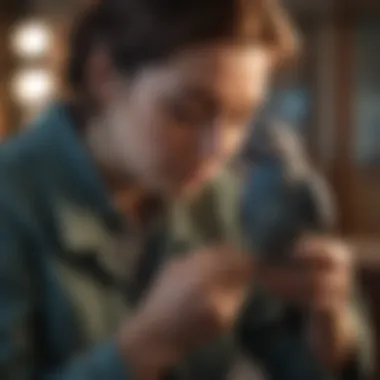

As pet birds age, they may begin to experience a range of health issues that are often linked to aging. Similar to other animals, older birds may be more prone to diseases like arthritis and organ failure. Age-related decline can manifest as changes in behavior, activity levels, and physical appearance.
Routine veterinary check-ups become increasingly important as birds age. These assessments can help in early detection and management of health conditions that are common in geriatric birds. Providing adequate care, comfortable living conditions, and mental stimulation will also contribute to a better quality of life in older age.
Signs Indicating Serious Health Issues
Understanding the signs that indicate serious health issues in pet birds is an integral part of ensuring their well-being. Pet birds may not express illness like other pets do. Therefore, owners must be observant and knowledgeable about changes that could signal distress. Recognizing these signs early can make a significant difference in the health and longevity of a bird. Early intervention often results in better outcomes, helping to avoid potential fatalities.
Behavioral Changes
Behavioral changes in birds can be subtle yet profound indicators of health issues. Normal behavior might include playful interactions, vocalizations, and a social demeanor. If an owner notes a sudden decrease in activity or engagement, it could be time to assess the bird’s health more closely. Specific signs to watch for include:
- Lethargy: A noticeable lack of energy may suggest underlying health problems.
- Changes in Vocalization: Either an increase or decrease in vocal sounds can indicate distress or discomfort.
- Isolation: If a bird starts distancing itself from people or other birds, this could signal emotional or physical distress.
- Aggression or Irritability: Uncharacteristic aggression may stem from pain or discomfort.
These behaviors can be indicative of potential issues ranging from infections to systemic illness. For example, if a typically affectionate cockatiel refuses to engage with its owner, it can serve as a prompt for careful observation and veterinary consultation.
Physical Signs of Distress
Physical signs of distress can manifest in various forms and should never be taken lightly. These manifestations often speak volumes about a bird's condition. Key physical signs to monitor include:
- Changes in Appearance: Feather loss, ruffled feathers, or changes in coloration can indicate stress or illness.
- Labored Breathing: Any sign of difficulty in breathing warrants immediate attention.
- Changes in Excrement: Unusual droppings can signal dietary issues or illness.
- Weight Loss or Gain: Fluctuation in weight can be indicative of health concerns, particularly if it occurs rapidly.
Keeping a close eye on these signs can prove invaluable in evaluating a bird’s health.
Bird owners should not dismiss even minor changes, as these can escalate quickly. A vigilant eye combined with timely veterinary assessments is vital to detect and address health issues before they become critical. Each detail matters immensely in the life of a pet bird.
The Emotional Impact of Losing a Pet Bird
Losing a pet bird can have a profound emotional effect on owners. Birds often serve as beloved companions, and their passing can evoke feelings of intense sorrow. Understanding this emotional impact is crucial in managing grief and navigating the complex emotions that arise from such a loss. The connection between a pet bird and its owner is often deep and meaningful, making the process of mourning unique to each individual.
Understanding Grief in Pet Owners
Grief is a natural response to loss. For bird owners, this grief can be compounded by the bond they shared with their pet. Birds, being social creatures, often exhibit personalities that attract deep affection from their owners. When a bird passes, owners may experience a range of emotions, including sadness, guilt, and anger.
It is important to recognize that there is no "right" way to grieve. Each individual will deal with their emotions at their own pace. Some may feel an overwhelming sense of loneliness without their pet, while others might replay memories and feel comfort in those reflections. Understanding that these feelings are valid can help owners process their loss more effectively.
- Common Grief Reactions:
- Sadness and tears
- Anger or frustration
- Anxiety about the future
- Feelings of guilt or regret
- Moments of comfort when recalling happy times
Support from friends and family can be crucial during this time. However, not all can fully grasp the depth of an owner's relationship with their bird. Some might dismiss feelings as trivial. The important thing is to seek connections with those who understand or have experienced similar losses, as they can provide empathy and validation.
Coping Mechanisms for Bereaved Bird Owners
Coping with the death of a pet bird requires a multi-faceted approach. It is vital to honor the pet's memory while also allowing oneself to heal. There are several strategies that can help with this process:
- Create a Memorial: Consider holding a small memorial for the bird. This can be as simple as lighting a candle or creating a dedicated space in your home to remember them.
- Journaling: Writing about emotions and memories can help articulate feelings that may be difficult to express. It can provide clarity and understanding in the midst of grief.
- Connect with Others: Joining support groups, whether in-person or online, can foster a sense of community. Websites like Reddit offer forums for pet owners to share their experiences and offer assistance to one another.
- Seek Professional Help: For some, professional counseling may be beneficial. A therapist can help navigate the complex emotions that arise from pet loss.
Embracing memories, from happy moments to simple routines, can also aid in healing. Familiar practices can bring comfort, even as they evoke sadness. Each individual will find their path through this process, but it is essential to remain open to both the good and the painful.
**"The heart that truly loves never forgets." **
Post-Mortem Care Strategies
When a pet bird passes away, owners face the important task of managing its remains with care and dignity. Post-mortem care strategies play a crucial role in achieving a sense of closure. These strategies include understanding how to determine the cause of death, making informed decisions on necropsies, and considering the best ways to memorialize the pet. It is vital for owners to approach this sensitive phase thoughtfully and respectfully.
Determining the Cause of Death
Identifying the reason behind a pet bird's death can bring peace of mind and is often a necessary step for owners. There are multiple factors to consider. Owners may notice behavior changes leading up to the bird’s passing, which can provide clues. A discussion with a vet can help in gaining insights into the potential diseases or conditions that could have contributed to the death. Understanding the cause is also crucial for the health of remaining birds, as many conditions can be contagious.
- Infectious Diseases: Look for signs of illness that could align with known diseases among birds. Some diseases might require quarantine measures for other pets.
- Environmental Factors: Review the living conditions where the bird resided. Check for toxins or hazards that could have been present.
- Dietary Issues: A sudden change in diet or neglect of nutritional needs can also lead to health complications. Recall recent feeding habits as part of your assessment.
"Understanding the cause of death aids in making informed choices for other pets as well as providing closure."
Deciding on a Necropsy
A necropsy, the avian equivalent of an autopsy, is a medical examination conducted to determine the underlying cause of death. This option can be particularly enlightening for owners who wish to gain deeper awareness of their bird's health issues. There are important factors to consider when deciding on a necropsy.
- Benefits of a Necropsy: Conducting a necropsy can reveal vital information about undiagnosed ailments, informing future care for other birds. Additionally, it provides a scientific approach to understanding bird mortality.
- Costs Involved: Be aware that a necropsy requires financial investment. Discussing the costs and benefits with a veterinarian will aid in making informed decisions.
- Timing: The sooner the necropsy is performed, the more detailed and accurate the findings are likely to be. Delayed assessments might lead to degradation of tissue quality, making conclusions more difficult.
When dealing with the death of a pet bird, post-mortem care strategies are not merely logistical—they represent a final act of responsibility and love. From determining the cause of death to deciding on further examinations, these steps help pet owners navigate through a difficult time with clarity and purpose.
Memorializing Your Pet Bird
The passing of a pet bird is a deeply impactful event for many caregivers. The act of memorializing a pet can provide comfort and a sense of closure. It allows owners to celebrate the life of their feathered companion and to commemorate the bond shared. Choosing memorial options can also serve as an essential step in the grieving process, transforming sorrow into a rooted remembrance.
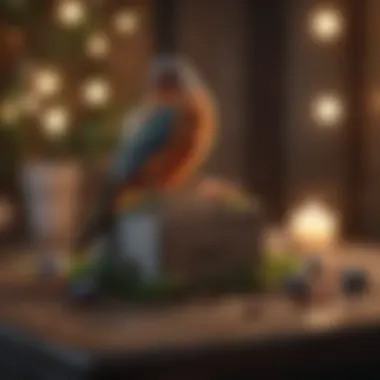

The importance of memorializing a pet bird lies in its emotional resonance. A suitable method acts as a coping mechanism, helping owners express their grief. Furthermore, it can be a way to share the memory of the bird with others who understand the attachment formed through years. Birds, often seen as joyful and lively companions, deserve remembrance that reflects their unique characteristics and personalities.
Selecting a Suitable Memorial Method
When selecting a method for memorialization, several factors should be considered. Owners need to decide whether they want a private remembrance or a more public one. Options range from simple to elaborate, each reflecting individual preferences and the specific connectedness felt toward the pet.
Some owners may opt for a burial, which provides a tangible resting place. This can occur in a garden or specific memorial area designated for pets. In contrast, a cremation may offer a more compact option. Many veterinary services provide these choices, sometimes even offering personalized urns that can be adorned or inscribed.
Other memorial methods include:
- Memorial services: Hosting a small gathering to honor the bird alongside friends and family who understand the loss can be comforting.
- Personal keepsakes: Creating a framed photograph or a shadow box with mementos like feathers, toys, or favorite perches can serve as lasting tributes.
- Planting a tree or flower: A living memorial can be created by planting something that will grow and flourish, as a reminder of the bird's vibrant life.
Considering the emotional needs and preferences during this process is crucial. Each method offers a different way to remember a beloved pet.
Creating a Lasting Tribute
The act of creating a lasting tribute can offer a profound sense of peace. Personalized tributes can take various forms, reflecting the unique character traits of the pet. Some owners might choose artistic expressions such as paintings or sculptures. Others may compose writings such as poems or letters that articulate their feelings and experiences with their birds.
A lasting tribute can also involve the use of digital mediums. A dedicated social media page, photo album, or blog can document the bird's life. This medium allows sharing memories and experiences, fostering a sense of community among other bird lovers.
"Memorials can provide a space to reflect, celebrate, and connect with the cherished memories of a pet bird, easing the grief journey."
Choosing elements for a tribute should be a thoughtful process. Owners should consider what best represents their bird's spirit. Meaningful elements, such as favorite activities or specific quirks, can further deepen the connection embodied in the tribute. Engaging family members in this process can also offer a collective experience, enriching the memorialization.
Preventative Measures for Longevity
In the context of pet birds, ensuring longevity is of utmost importance. Preventative measures can be viewed as proactive steps that every bird owner should consider. Addressing health issues before they manifest can contribute significantly to your pet's quality of life. Investing time and resources in these measures will not only enhance your bird’s lifespan but also reduce the emotional turmoil that accompanies premature loss.
Regular Health Check-ups
Regular health check-ups are crucial for pet birds. Like humans, birds can harbor undetected health issues. Routine visits to an avian veterinarian can help identify early signs of illness. These check-ups often include a thorough physical examination and necessary diagnostics. Such measures can lead to timely interventions. Avian vets can advise you on specific vaccinations and necessary treatments. It's advisable to schedule these visits at least once a year or more frequently for older birds.
Optimal Nutrition and Diet
Proper nutrition plays a vital role in avian health. Birds require a balanced diet that meets their specific nutritional needs. A blend of seeds, pellets, fresh fruits, and vegetables is ideal. Each species has its unique dietary requirements, which should be understood clearly. Inadequate nutrition can lead to various health issues, such as obesity or liver disease. Therefore, consulting with a veterinarian to formulate an optimal diet for your bird is essential. It helps in maintaining weight and promotes overall wellness.
Providing An Enriching Environment
An enriching environment is critical for a bird's mental and emotional well-being. Birds are intelligent creatures that require stimulation. This can be achieved through a variety of activities, such as toys, climbing structures, or interactive games. Moreover, regular social interaction with their owners or other birds is important. A well-designed space encourages natural behaviors. It can prevent stress and behavioral problems. Assessing the environment should include considerations for cage size, placement, and safety.
"A well-cared-for bird is a happy bird."
Resources for Further Support
Navigating the loss of a pet bird is not just about confronting the emotional upheaval; it also involves making informed decisions regarding their care and your own well-being. This section details vital resources that can enhance the support system for pet bird owners during this difficult time. By accessing veterinary assistance and emotional support, you can find guidance and relief through your grief.
Veterinary Assistance
When a pet bird passes away or becomes ill, veterinary assistance plays a crucial role in understanding the circumstances surrounding their health. Specialized avian veterinarians possess the expertise required to diagnose and treat a variety of avian illnesses. They can provide clear insights about common diseases affecting birds, helping owners recognize symptoms early. It is also through regular check-ups with a trusted vet that owners can identify potential health issues before they escalate into serious problems.
Here are some important benefits of seeking veterinary assistance:
- Diagnosis of Underlying Issues: Vets can help determine the cause of death, which may not always be obvious to the untrained eye.
- Guidance on Aftercare: They can advise on the best practices for post-mortem care and memorializing your pet bird.
- Preventative Health Tips: Regular appointments can ensure that your bird remains healthy and detects any signs of distress early.
- Mental Health Support: Many vets understand the emotional impact of losing a pet and can offer resources or recommendations for support.
"Regular veterinary care not only extends the life of your pet bird but also helps alleviate the distress associated with sudden health crises."
Support Groups for Grieving Pet Owners
The emotional impact of losing a pet bird can be profound. This grief may often feel isolating, but connecting with others who have shared similar experiences can be immensely beneficial. Joining support groups allows bird owners to express their feelings in a safe environment, where they can share stories and coping strategies, leading to emotional healing.
Several notable aspects of support groups include:
- Community Understanding: Members share the unique challenges of pet bird ownership and loss, creating camaraderie.
- Shared Resources: Participants can exchange advice on coping mechanisms, as well as suggestions for memorial options.
- Validation of Emotions: Connecting with others can help owners feel that their feelings are normal and understood, reducing feelings of loneliness.
- Access to Professional Help: Many support groups may have facilitators or external resources that guide members toward further psychological support if needed.
Finding a suitable support group is essential for processing grief effectively. Options may include local community groups, online forums, and dedicated websites focused on pet loss.
Utilizing these resources can foster resilience in the face of loss, equipping pet bird owners with the knowledge and support needed to navigate the poignant journey of recovery.
Closure
The conclusion of this article underscores the significance of awareness and preparation in managing the complex realities surrounding pet bird mortality. Understanding the various aspects of pet bird care, including recognizing health issues and responding appropriately, can greatly enhance the quality of life for these animals. Not only does this awareness prepare owners for the eventuality of loss, but it also promotes proactive care that may extend the lifespan of pet birds.
The Importance of Awareness and Preparation
Awareness allows pet bird owners to identify signs of distress and illness early. Knowledge of common health issues—ranging from infectious diseases to nutritional deficiencies—enables timely veterinary intervention. This preparedness plays a crucial role in ensuring that pet birds receive the care they need, which may ultimately contribute to their longevity of life.
Preparation extends beyond health awareness. Having a plan for post-mortem care can alleviate the emotional burden when the moment of loss occurs. This includes knowing when to consider a necropsy or what memorial options are available. Thoughtful consideration of these matters ensures that owners can make situation-appropriate decisions without the added stress of sudden grief and confusion.
The emotional toll of losing a pet bird can be significant. Understanding this emotional process from the forefront allows owners to engage in effective coping mechanisms. It creates a space for them to mourn while simultaneously honoring the memory of their pets through meaningful tributes.
The benefits of fostering an environment of understanding and preparedness cannot be overstated.
- Enhanced Care: Promotes proactive health measures.
- Emotional Readiness: Prepares owners for the grieving process.
- Thoughtful Decision-Making: Facilitates informed choices regarding post-mortem care and memorialization.




